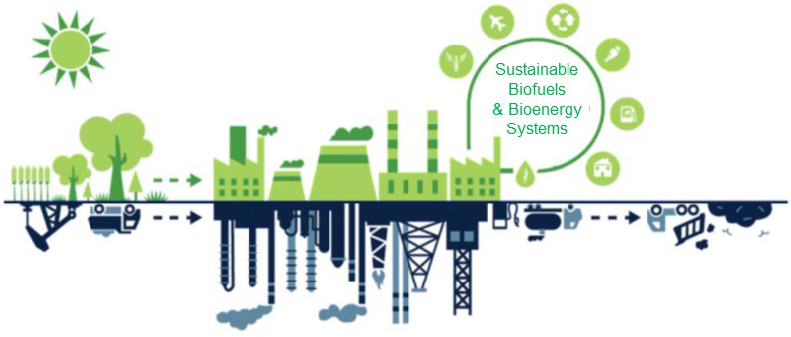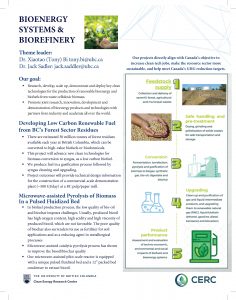
Bioenergy systems & biorefinery
We identify, develop, pilot and evaluate key sustainable bioenergy technologies, prioritized through their techno-economics, environmental and social impacts, for the production of renewable fuels and co-products from waste biomass materials

FEATURE PROJECTS
- Gasification of biomass residues to syngas and renewable natural gas in two-stage fluidized beds (Research summary)
- Pyrolysis of biomass to bio-oil and biochar in microwave-assisted pulsed fluidized beds (Research summary)
- Torrefaction for torrefied pellets using pulsed fluidized beds with catalytic combustion of volatile organic compounds. (Research summary)
- Biomass pellets from forest and agricultural residues: supply chain and pretreatment (Biomass website)
- Biofuels for decarbonizing long distance transport in British Columbia (BC-SMART)
- Biorefining Research and Innovation Centre (BRIC)
- China-Canada Bioenergy Centre (c-cbc website)
- Tools for the prediction of alternate biofuels for aerospace applications (Research summary)
- Thermochemical sludge conversion through hydrothermal liquefaction (Research summary)
- IEA Bioenergy Task 39 – Commercializing Conventional and Advanced Transport Biofuels from Biomass and Other Renewable Feedstocks: (Website)
-
-
- Progress in commercialization of biojet /Sustainable Aviation Fuels (SAF): Technologies, potential and challenges- 2021 (Full report)
- Implementation Agendas: 2018-2019 Update- Compare and Contrast Transport Biofuels Policies-2020 (Full report)
-
-
Our projects directly align with Canada’s objective to increase clean tech jobs, develop a bioeconomy to make our resource sector more sustainable, and decarbonize the economy to meet Canada’s GHG reduction targets. The long-term benefits for BC include the increased bio-product industrial sector competitiveness.
We promote joint research, innovation, development and demonstration of bioenergy products and technologies between industry and academia from all over the world.
Theme members
Theme leaders


